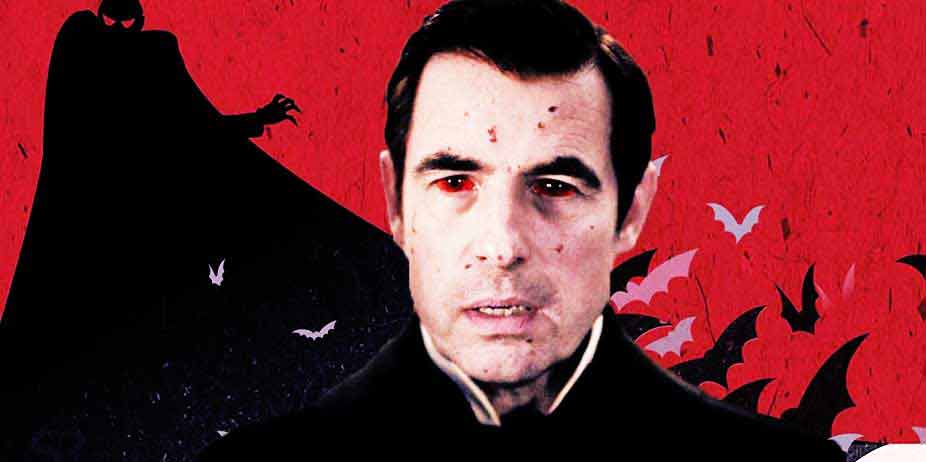 Dracula
(2020)
Dracula
(2020)
Loosely inspired by Bram Stoker's novel, this three-part film series features everyone's favorite undead Count, in a new and tantalizing way, but the first two episodes have more passion and allure than the final installment.
A broken, half-dead Jonathan Harker (John Heffernan) winds up at a convent deep in the Romanian countryside, after a desperate escape from the castle of Count Dracula (Claes Bang). The curious Sister Agatha (Dolly Wells) demands he describe the last few days, and his interactions with the notorious count. Jonathan reports that he came to Dracula's castle to deliver sale papers, as per his English law firm's instructions. There, he became increasingly unsettled and suspicious of his host, a sinister but charming older man who seems mysteriously absent during the day. He also seems to be getting younger, while Jonathan is waking up weaker and older.
Curious to discern what motivates Dracula's aversion to sunlight and crosses, Sister Agatha bombards him with questions... until the count himself shows up on the convent's doorstep. What follows locks them in a battle that endures over a century, as Dracula boards a ship across the sea bound for England and makes an unexpected discovery when he reaches the other side.
The first episode is arguably the most like the book, from the letters Dracula demands his guest write to far-away Mina, to Jonathan's horrific discoveries in the old castle. But the writers, Steven Moffat and Mark Gatiss, throw in their own twists, some of which are brilliant ideas -- a labyrinth of rooms, how Dracula absorbs the memories and powers of those he drinks from, and his discriminating tastes. The second episode is equally engaging, a mind-bending battle of wits between Sister Agatha and Dracula, while exploring the ill-fated journey of his ship across the Channel. Few films bother at all with his on-board exploits, and this one fleshes it out, as he rains down terror on the hapless, trapped inhabitants of The Demeter. This adaptation makes him into a lustful (for blood) vampire who cannot control his impulses -- but also as a remorseless psychopath, a true villain of towering charisma and unbridled horror, who calmly gaslights Jonathan ("No, you are not hearing a baby..."). And, the series raises interesting questions about faith (or lack thereof), fear, and facing one's own demons. It also has some truly brilliant "jump scares" (you may or may not want to watch it at night, some of it is just plain creepy). And, it's just flat it out funny at times, rampant with quips and in-jokes to the writing duo's other projects (Doctor Who and Sherlock).
Though I quibble with some of the choices in the first two episodes (I don't think they needed a naked Dracula parading around in front of a bunch of nuns), they are strong -- campy but self-aware of their absurdities, and reveling in the grotesque imagery of the castle and the ship. But, the third and final episode was a letdown. The entire story transfers to modern-day London and immediately loses its impact. Dracula is far less interesting in modern terms. It becomes much more "talky" and focused on banal interactions. Lucy is once more turned into a "slut" ("I know what you mean," she tells a friend; "that's slut-shaming") and her fate is horrific. There's just something far more powerful, sexy, and thrilling about a cape-wearing king of his kind stalking Victorian graveyards than a vampire who uses Tinder. It's a bland ending to a promising series. Then again, if you stop the second episode 30 seconds before the end, you can conclude your viewing on a powerful, satisfying note and skip the rest.
Sexual Content
Three heterosexual sex scenes with movement (Dracula
projects them in people's minds when he drains them of
blood; two are clothed, one is hazy/obscured). A gay
Victorian couple (one marries a woman, to hide it; his
partner mentions having loved him); a stereotypical gay
man in the modern times (limp wristed, talks in a high
pitched voice). Dracula's attacks on people are often
erotic in their tone, and he references Jonathan as "his
bride." It's implied Lucy is promiscuous. A prolonged
scene features Dracula standing naked (backside nudity,
the front is always obscured) in front of a group of
nuns. Sexual references. A burned corpse is naked (her
private bits obscured). A woman asks a man if he had
sexual intercourse with Dracula. The ending shot
includes side/backside nudity.
Language:
Half a dozen abuses of Jesus' name. One sh*t. Various
mild profanities.
Violence:
Lots of blood. It dribbles and gushes from Dracula's
mouth when he feeds. Drenches floorboards and drips down
staircases. Spatters the floor and walls. We see gashed
open necks and other injuries, including a man's broken
leg (the bone protrudes). An explosion tears through a
ship and sets it ablaze. Half-desiccated, or grotesque
undead corpses walk, crawl, and creep around, including
an infant. Vampires are staked, shot, and set on fire.
Dracula decapitates a nun during prayer, then has his
wolves tear the rest of them apart (off-screen). He
peels a man's face off his own, having worn it like a
person-suit. Vampires turn into hideous-looking
creatures. One of them is cremated (we see her screaming
while being burned) and comes back as a walking charred
corpse. Many jump-scares. Flies crawl inside people's
eyelids and behind their eyes. Dying people peel off /
dislodge their fingernails.
Other:
A nun expresses a lack of belief in God, then changes
her mind, then is ambivalent. Crosses and other religious relics (wafers, Bible
pages) ward off Dracula, but not other vampires.
